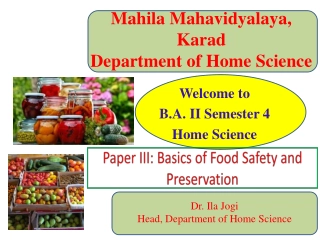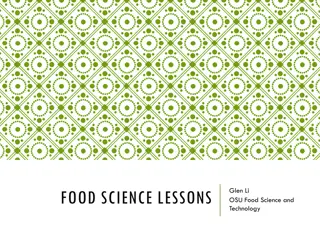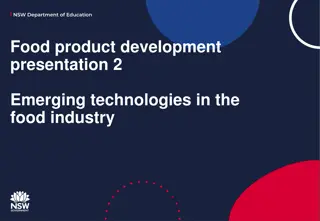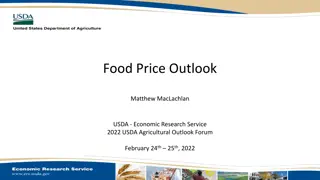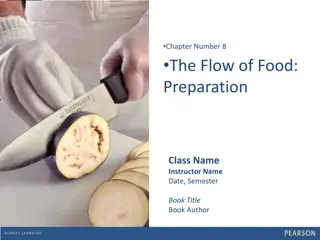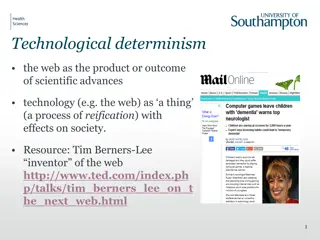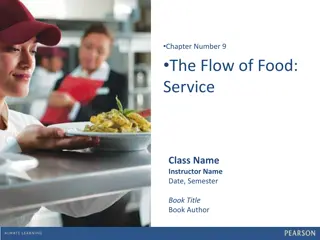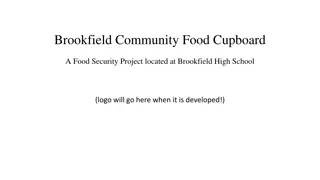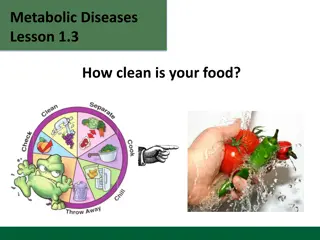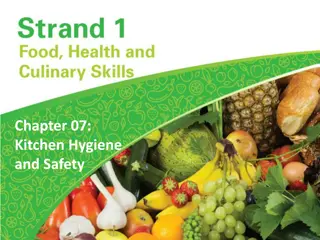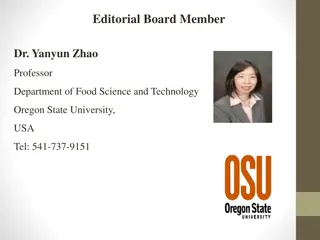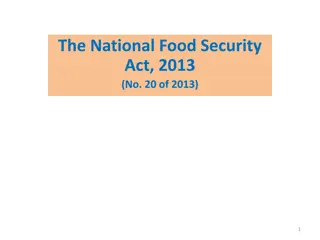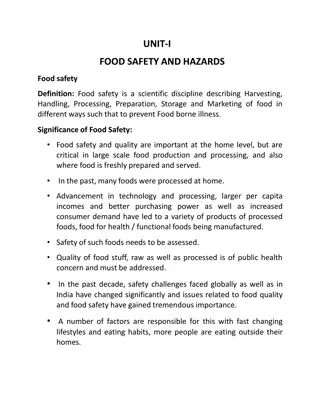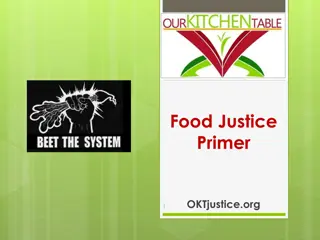Exploring Food Science and Technology in Modern Society
Delve into the world of food science and technology with insights on what scientists do, the importance of understanding food, definitions of food science and food technology, factors affecting food spoilage, and traditional and modern food processing technologies. Gain knowledge on testing hypotheses, consumer needs, food materials behavior, food spoilage causes, and various food processing methods.
Download Presentation

Please find below an Image/Link to download the presentation.
The content on the website is provided AS IS for your information and personal use only. It may not be sold, licensed, or shared on other websites without obtaining consent from the author. Download presentation by click this link. If you encounter any issues during the download, it is possible that the publisher has removed the file from their server.
E N D
Presentation Transcript
British Nutrition Foundation: National food and nutrition education conference Food Science in Action Dr Anil de Sequeira, BSc (Hons), MSc, PhD, FIFST, CSci, FHEA, Vice Chair Education and Careers Forum, Institute of Food Science and Technology (IFST) ; External Affairs Co-ordinator (Biology) and Course Leader BSc (Hons) Food with Nutrition, Bath Spa University, UK E mail: a.desequeira@bathspa.ac.uk , Tel: 01225 875 737
WHAT DO SCIENTISTS DO? We ask a Question and then seek to answer the question Can be in the form of a Hypothesis which we then seek to test We seek to test in order to ascertain level of risk
WHY SHOULD WE LEARN MORE ABOUT OUR FOOD? We as consumers want our food to be fresher, more natural with minimal packaging and of high quality in terms of flavour, texture, appearance, safety and nutritional value. We want our food to be convenient and require minimal preparation and have a good shelf life.
WHAT DO WE MEAN WHEN WE REFER TO 'FOOD SCIENCE' WHAT DO WE MEAN WHEN WE REFER TO 'FOOD SCIENCE' OR 'FOOD TECHNOLOGY'? OR 'FOOD TECHNOLOGY'? Food science -- is a coherent and systematic body of knowledge and understanding of the nature and composition of food materials, and their behaviour under the various conditions to which they may be subject. Food technology -- is the application of food science to the practical treatment of food materials so as to convert them into food products of the kind, quality and stability, and so packaged and distributed, as to meet the needs of consumers for safe, wholesome, nutritious and attractive foods.
WE NEED TO UNDERSTAND What causes food spoilage What are the types of food spoilage What are the factors that affect growth What affects enzyme activity How to control Food Spoilage
TRADITIONAL AND MODERN FOOD PROCESSING TECHNOLOGIES Modern Processes In-container sterilization (retorting) Aseptic (UHT) processing Pasteurisation (HTST) Irradiation Spray drying Freeze drying Extrusion cooking Freezing and chilling Membrane processing Modified atmosphere processing Microwave and radiofrequency heating Use of fluidised beds for freezing and drying High Pressure Processing Traditional Processes (prehistoric) Sun drying Oven drying Smoking Salting Pickling Fermentation (Freezing)
ENZYMATIC BROWNING ENZYMATIC BROWNING The browning that develops when cut or bruised surfaces of fruits, vegetables and shellfish are exposed to air is called ezymatic browning. The enzyme is present in both plants and animals.
OH OH O H O OH 2 H O 2 OH O 1/2 O2 Catechol 1,2-benzoquinone OH Hydroxyhydroquinone (1,2,4-trihydroxybenzene) O OH O OH Oligomer + OH 4-hydroxy-1,2-benzoquinone Phenol oxidase catalysed oxidation of catechol
TIME-TEMPERATURE INDICATOR A Time-Temperature Indicator (TTI) is a smart label that temperature history of a product and exhibits an irreversible change in colour or shape in response to the cumulative effect of time and temperature. monitors the
Browning 11/09/2024
CONTROL CONTROL OF OF ENZYMATIC ENZYMATIC BROWNING BROWNING Inactivation of PPO with heat Chemical inhibition of PPO Reducing agents Exclusion of oxygen Proteolytic enzymes Treatment with honey
FRUIT JUICES Though less specific and less potent, the organic acids citric acid (6.17) and malic acid (6.18) do have advantages. Not only are they common components of fruit juices but also their acidity helps to keep the pH well below the optimum for phenolase action (approx. pH 6.5). Immediately after being peeled or sliced, fruit such as peaches are often immersed in baths containing dilute solutions of these acids, frequently supplemented with ascorbic acid or sulphite
TEA The enzymic oxidation of polyphenolic substances is a highly desirable feature of one particular foodstuff- tea. The tea we drink is a hot-water infusion of the leafy shoots of the tea plant, Camellia sinensis, which has been processed in various ways depending on the type of tea to be produced. The type of tea that most of us drink is known as 'black tea', to distinguish it from the 'green tea' we usually call 'China tea'
FOOD OF THE FUTURE? Insects Artificial meat Seaweed 3D printed food
Tasting of Flavoured Waters a practical activity in school 1. Colour summer fruits flavoured water with green food dye. 2. Colour strawberry flavoured water with red food dye. 3. Pour 10ml of each drink into a small cup. 4. Label each sample, e.g. 512, 886. 5. Ask the pupils to taste the samples in turn and describe the flavour of each. They should drink some plain water between each sample.
SOME USEFUL RESOURCES IFST - Love Science The Love Food The Science of Cooking Peter Barham
FOOD/NUTRITION AT BATH SPA UNIVERSITY BSc (Hons) Human Nutrition Accredited by the Association for Nutrition. Main foci nutritional science and biological sciences Complementary themes in food quality and safety and in health Sandwich Year Optional BSc (Hons) Food with Nutrition Students do not need a traditional science background to be accepted onto the course Extensive links with Food industry. Focus on the food supply chain, food quality, food safety and product development Our students are eligible to become IFST student members and Graduates from this programme can go on to secure professional membership with IFST Sandwich Year Optional 03 November 2017
All day some of you dream about sports All day some of us dream about Science, trying to gain improved knowledge that will improve our understanding of food science, technology and nutrition
Thank you for taking part Any questions?



